Zero Waste (+ Plastic-Free) Gardening
I may have got to grips with plastic-free living and the zero waste lifestyle when it comes to inside the home, but when it comes to the garden, I’m a plastic-free newbie. Having lived in an upstairs apartment with little more than a balcony for the last four years, I haven’t really needed to think about it.
Now we’ve moved and I finally have the garden space I’ve been dreaming about all that time, I’m really keen to keep up with the plastic-free lifestyle and avoid using plastic in the garden where I can. (Spoiler alert – there have been compromises!)
Of course, paving or wood chip mulch would solve the waste problem straightaway, but I’m keen to grow as much food as I can, so no easy options for me!
Starting from scratch with anything can be daunting, and the hardware stores seem to have more plastic packaging in them than the supermarkets! I do not have all the answers – we have only been living here for three months, after all – but I’m beginning to find zero waste solutions and plastic-free alternatives that work for me.
No doubt in another three months I’ll have far more answers (and if you have any tips of your own, please share them!) but I thought I’d share my plastic-free and zero waste gardening solutions so far.
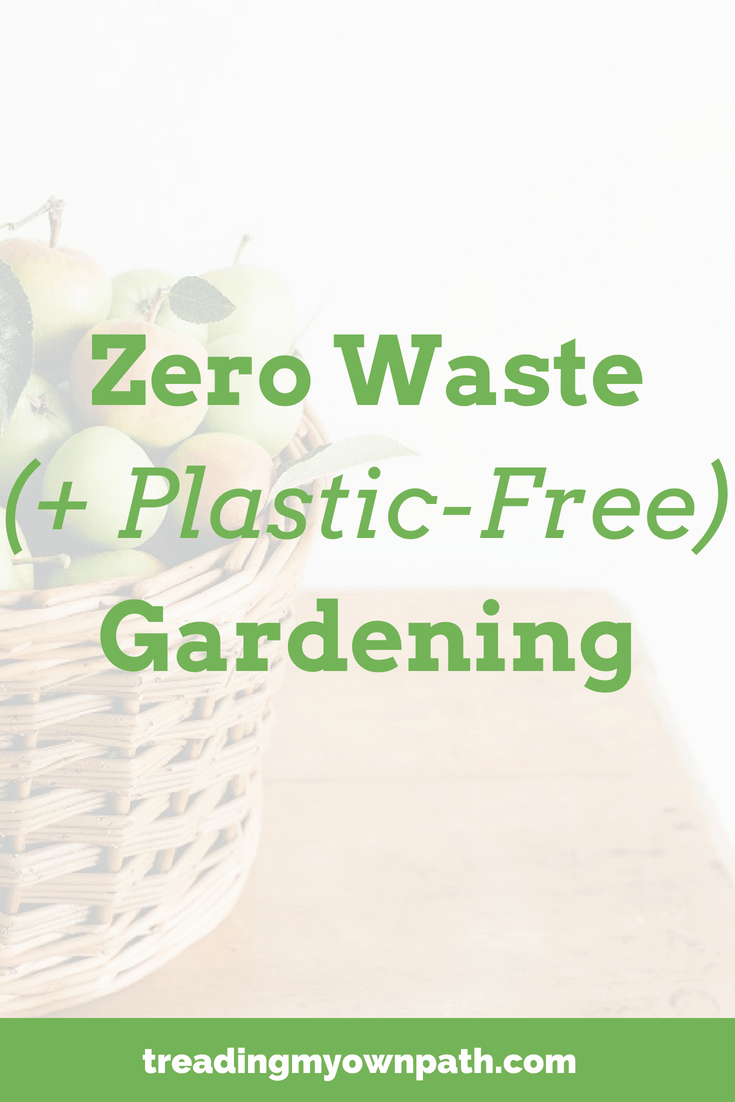
Starting with the Soil
We were lucky enough that when we moved, the four garden beds were pre-filled with soil (and pre-planted with seedings). However, there is still plenty of space for planting additional things, and empty pots need soil to fill them. Perth doesn’t have soil: it is a city build on grey sand, with no nutrient content or water-holding capacity whatsoever. I
t’s not possible to scoop up some soil from the ground and put it in a pot. You have to source it from somewhere.
We’d been given some potting mix in 25 litre plastic bags (the only size available where I live) but the bags seemed so wasteful that I didn’t want to buy any myself. Instead I found a compromise: coconut coir.
It’s a waste product from coconut growing areas. It comes as a dry, lightweight block wrapped in a very thin plastic layer. Once added to water it expands: this block will make enough to fill a wheelbarrow (90 litres).
To buy this much potting mix would require four bags, and heaps more plastic.
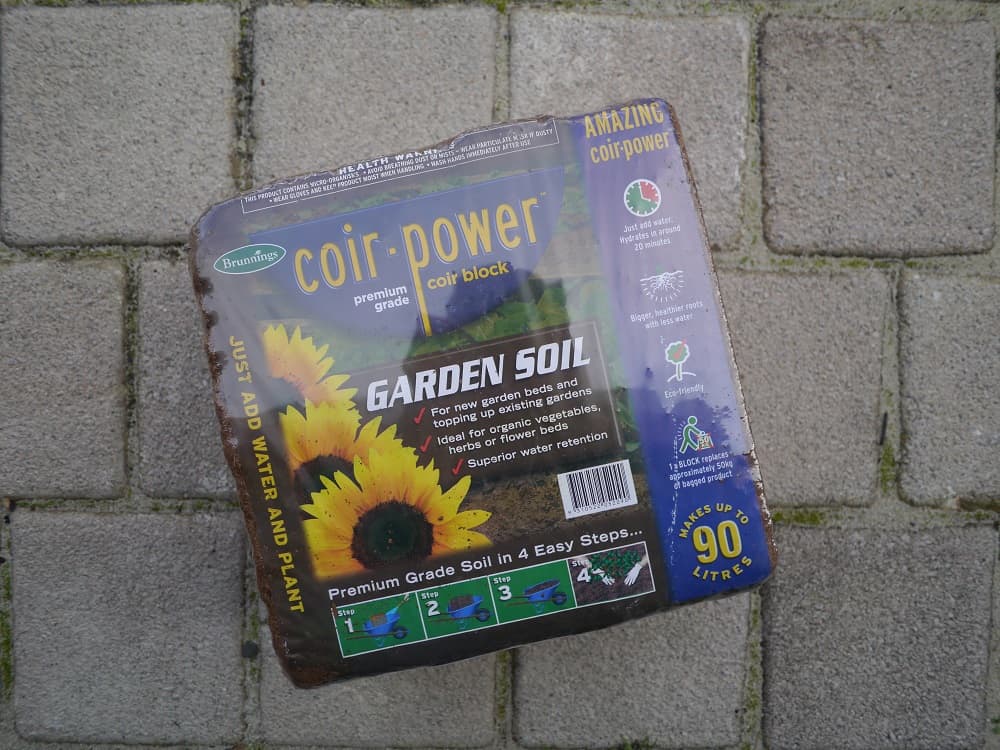
Peat-free potting mix made from a waste product: coconut coir.
Coconut coir itself does not have any nutritional value, but can be mixed with worm castings, compost or other fertilisers to add nutrients.
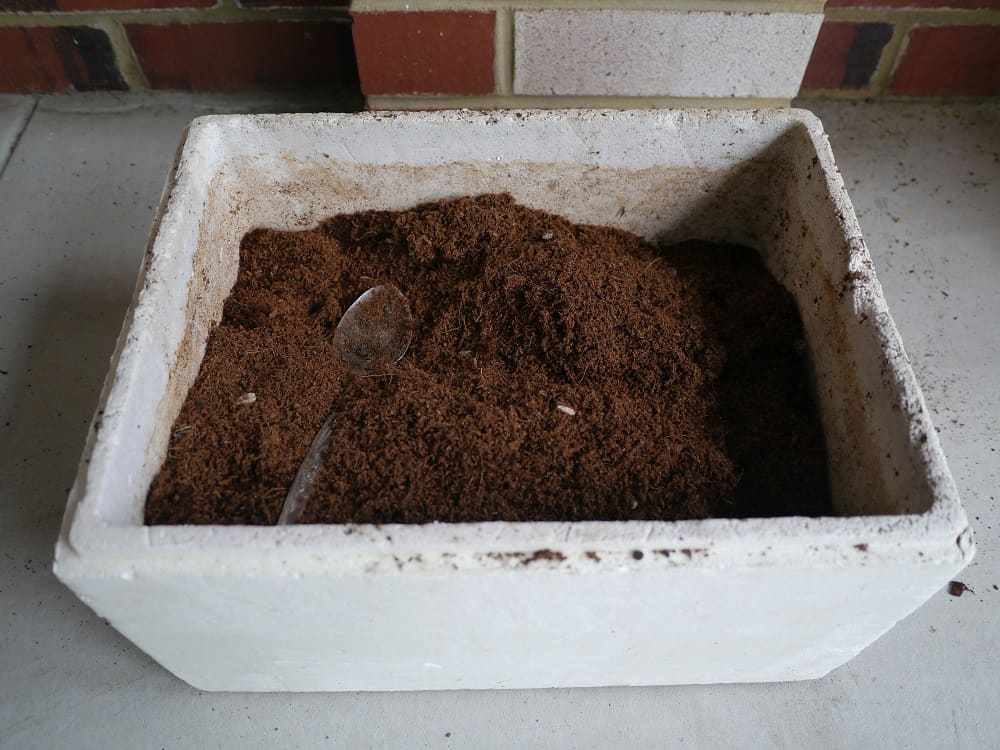
Coconut coir once water has been added. This old polystyrene box is our old worm farm. Despite hating plastic and especially polystyrene, I couldn’t throw it out knowing it still had (some) use. It’s good for mixing up potting mix and saves me from buying a new container.
Coconut coir is great for raising seedlings, but to top up the garden beds (and create new garden beds) we needed soil. After a couple of phone calls, I found a local soil company that could deliver a trailer load of soil to us. This tiny looking pile is half a cubic litre (500l), which is the equivalent of 40 bags.
Whilst we didn’t need it all, we have been able to store what we didn’t use in our wheelie bin (we don’t use it for rubbish, after all) until we can use it.
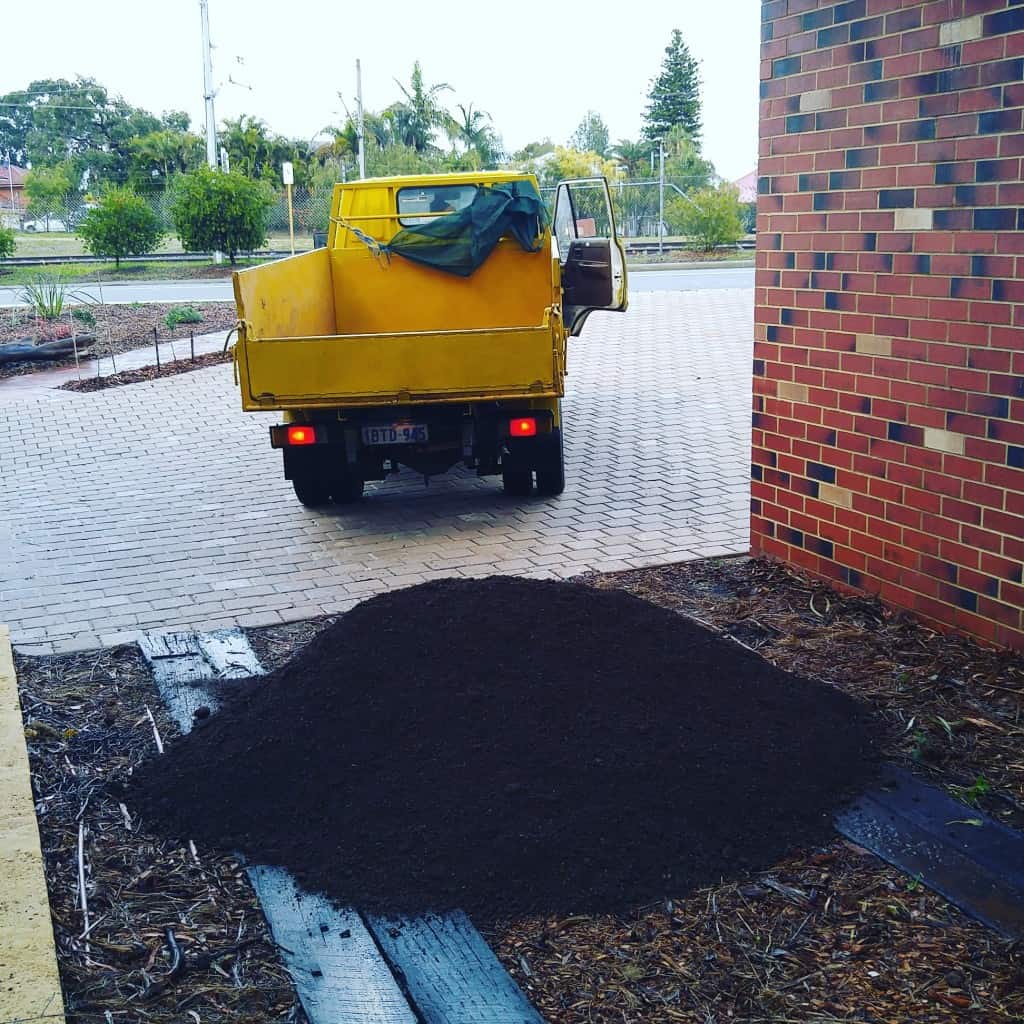
Plastic-free zero waste soil delivery.
Compost, Worm Castings and Manure
In the beginning, we decided to buy a few bags (in plastic – shudder) of mushroom compost and animal manure, to get things started. We have two compost bins, but they are yet to crank out any compost. In future I hope to make all of our compost at home. (We also plan to get more bins.)

Our two compost bins. We hope to get more so that we can produce all of our own compost at home.
Clearly, if we plan to produce all of our own compost at home we will need more plant matter and food waste to compost! We’ve probably got enough weeds on the verge to provide all the nitrogen we could ever want, but compost needs both carbon and nitrogen. Our solution is to collect excess coffee grounds from the local cafe. We’ll also go leaf collecting to gather some extra carbon for the pot.
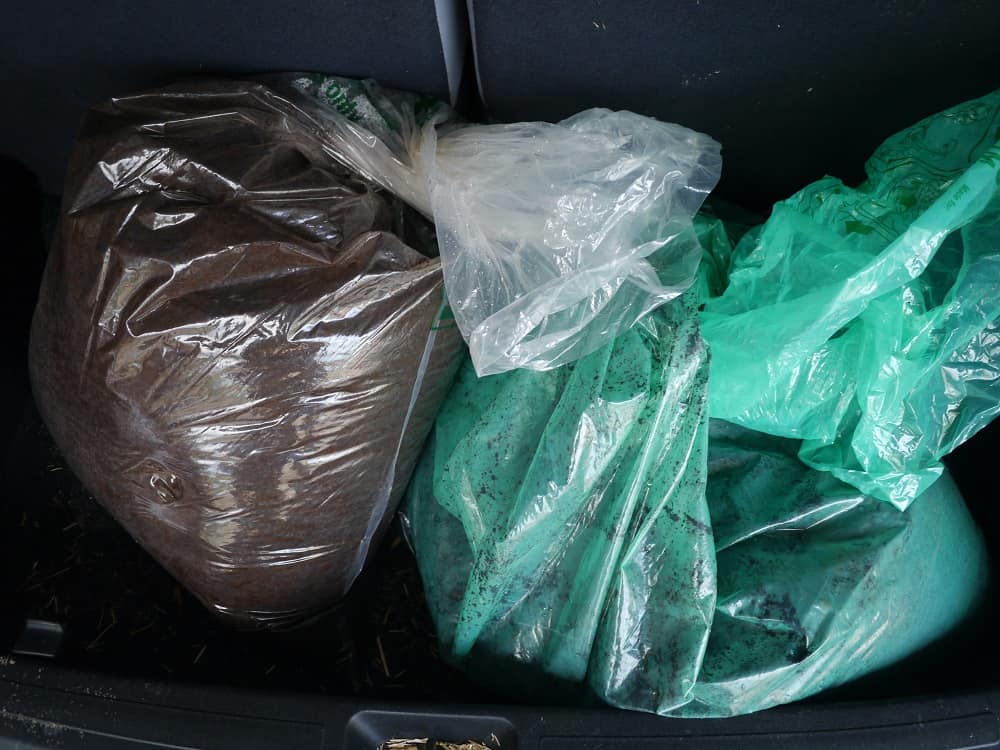
Coffee grounds from a local cafe (they were pre-packaged in plastic). We may have been a little over-eager… I could not lift these bags, they were so heavy! Coffee grounds are a great compost additive though, and we could never drink this much coffee!
Our solution for animal manure was simple. Our friends own a cow, and offered us their “spare” manure! We can provide our own containers and fill them up. Sounds stinky, but it’s plastic-free at least!
On top of this, we still have our worm farm, and can use the castings to enrich the soil.
Adding Nutrients to the Soil
We’d rather not buy plastic bottles of plant food because aside from the waste, we prefer to feed our plants natural ingredients and these pre-packaged feeds are high in salts and urea. The most natural options recommended seem to be kelp, soy bean meal (an alternative to blood and bone), blood and bone, rock dust, fish hydrolysate and pelletized chicken manure.
The soil company who delivered our soil also sell these in bulk, so we can refill our own containers when we need to.
Another, more cost-effective place to source these products is a stock feed place. We didn’t need the huge quantities, but a local lady purchased some and split the bags into smaller amounts for us. If that hadn’t been an option, these ingredients all have a long shelf life.
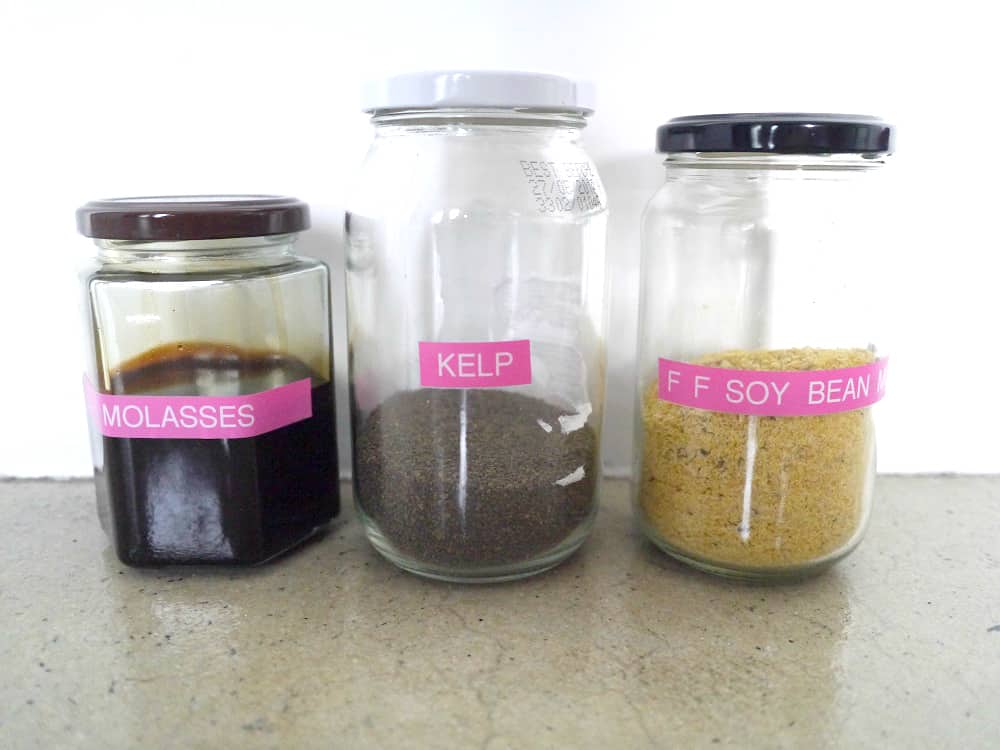
A local lady purchased these in bulk, and split into containers for a group of us. (She added the plastic jar labels – it’s not something I would have done!)
Seedlings and Seeds
To start with, we purchased a few seedling punnets. I’ve begun to plant seeds in the repurposed punnets and hope that I will be able to grow everything from seed in the future. Even seed packets sometimes contain tiny little ziplock bags.
Much further down the track I hope to be able to save my own seeds. Right now we are at the beginning of our journey. I need to learn what grows well and what we like to eat before I even think about saving seeds! I’m not worrying about the tiny little ziplock bags – for now ; )
We have swapped seeds with our neighbours which has worked well, as most seed packs seem to expire before all the seeds have been planted. This way we double our selection (and they do too) and the seeds are fresher – hopefully meaning that more germinate!
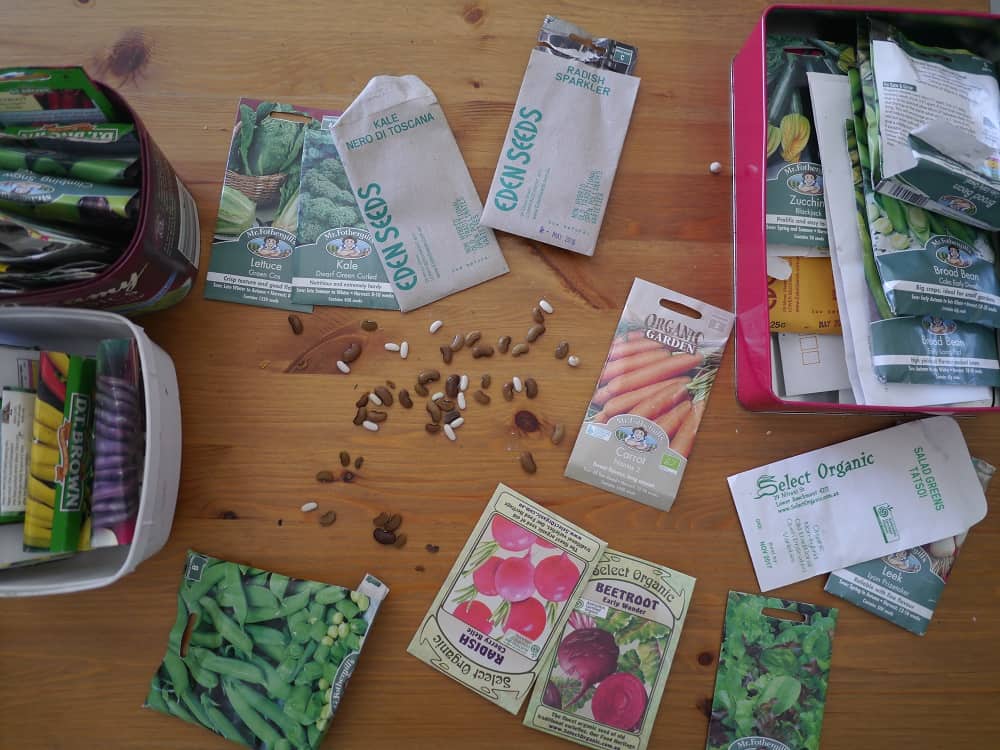
Seeds on the left are our neighbours’; seeds on the right are ours. Seeds in the middle are saved from the beans that were growing in the garden. No idea what the different types are, though!
Repurposing
We’ve been able to find heaps of plant pots for free on the verge, which has been great for growing seedlings. Alongside the few seedling punnets we’ve bought, we now have enough to pot on our seedlings to beef them up before they go in the beds.
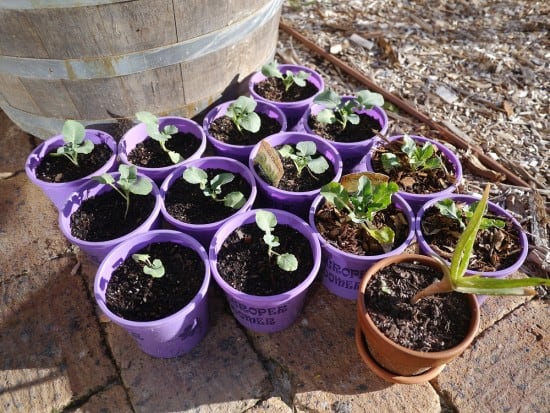
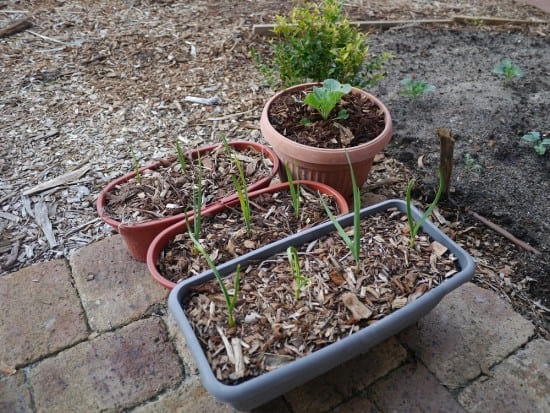
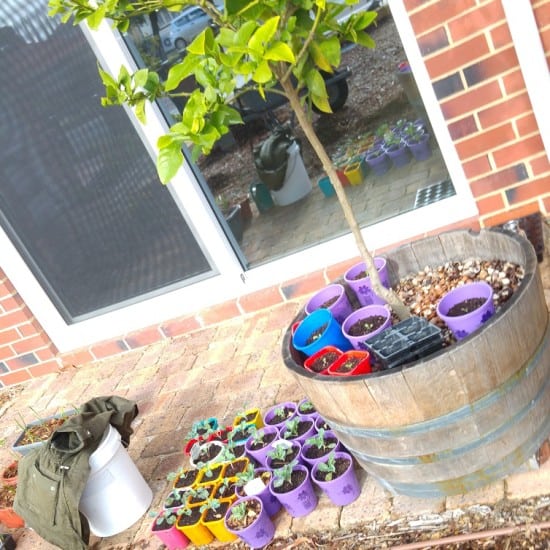
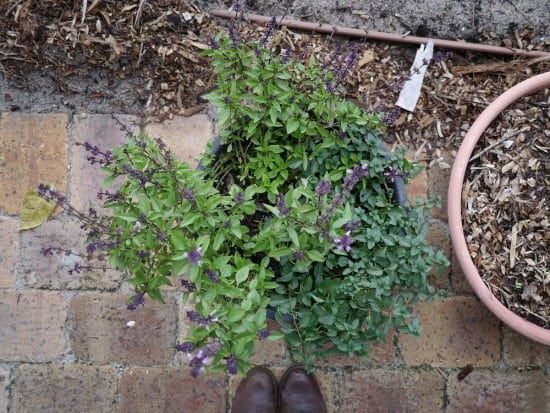
What about the plastic so far?
There is no way I’m throwing any of the plastic we’ve used so far in the bin. Not a chance! But clearly, plastic bags that contained sheep manure and compost are not suitable for recycling as they are. They need to be clean. Such is my dedication that I cleaned them!
I would have just put them all in the washing machine out of laziness but my husband would have killed me (and I didn’t really want to wreck the washing machine). So I washed them all off as best I could outside (in a tub of water which I used in the garden), and then brought them in and scrubbed them in the shower with an old brush.
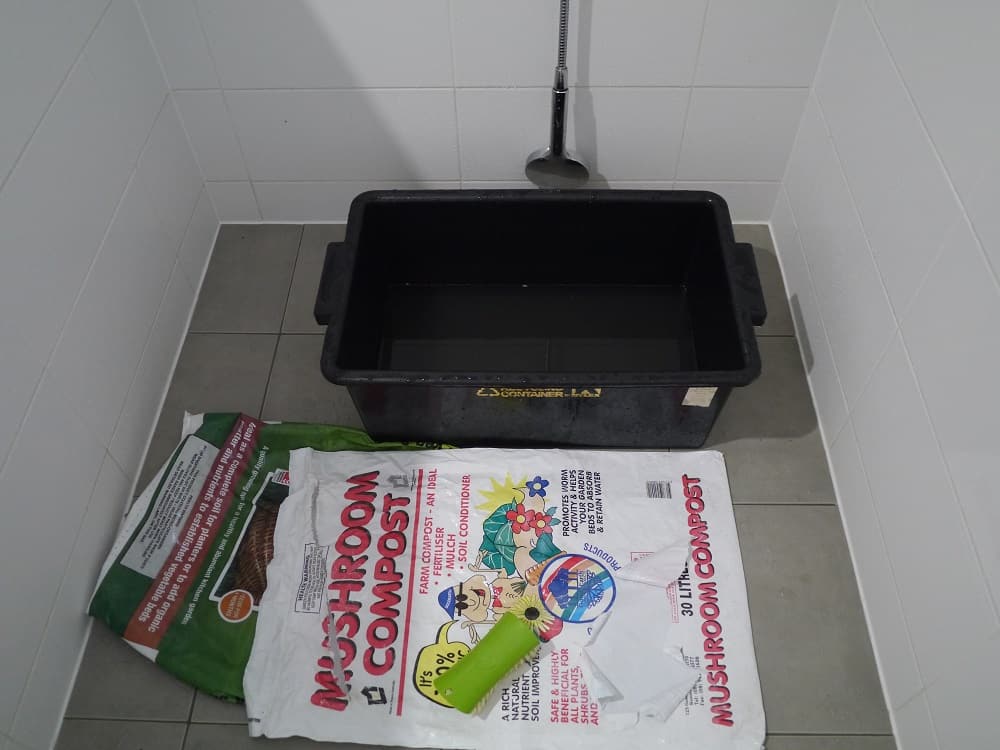
True story. I washed out my soil bags so I could recycle them properly.
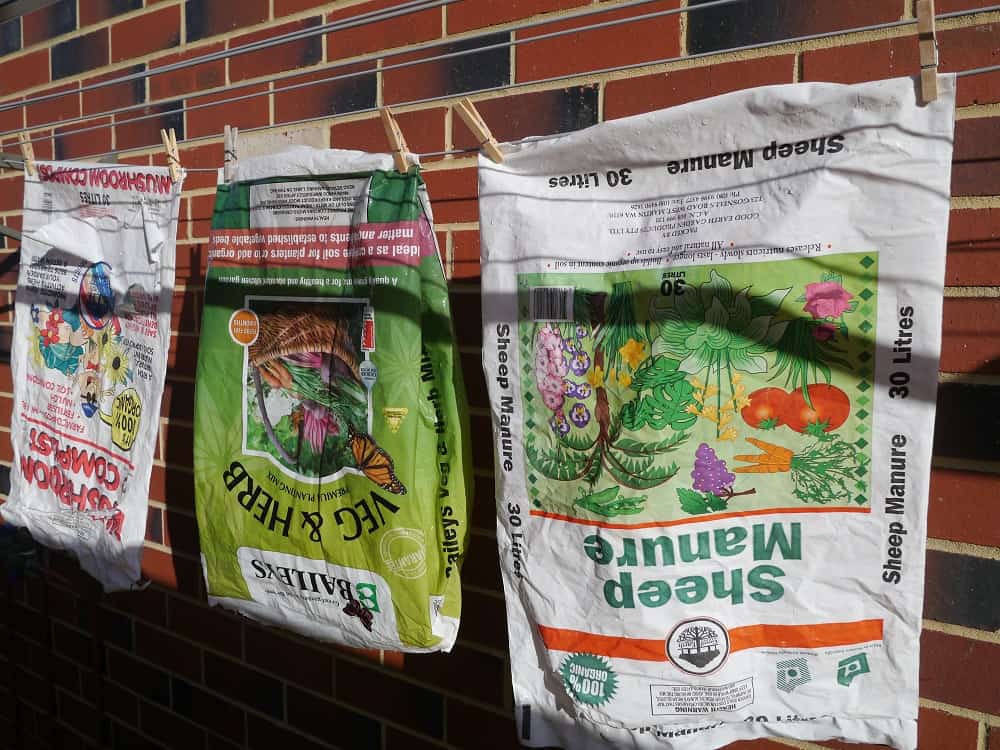
Hanging on the washing line to dry.
The only real waste item we’ve generated so far is the plastic labels that come attached to the seedling punnets. Most of them are currently in the garden reminding us what is planted where, but when the season is finished we may not have another use for them. Still, if we can reduce our garden waste to just a few seedling labels then I will be very happy!

Plastic-free zero waste gardening in action : )
Now I’d love to hear from you! Do you have a garden? Do you have any tips for reducing waste and cutting down on plastic? Do you have any suggestions for how I might improve things further, or notice anything I’ll need to think about in the future? Is there anything you’ve struggled with? Do these struggles remain or have you managed to overcome them? Are there any compromises you make that you think are worthwhile? Are you put off gardening because of all the plastic packaging and chemicals? I’d really like to hear your thoughts so please leave me a comment below!
[leadpages_leadbox leadbox_id=1429a0746639c5] [/leadpages_leadbox]


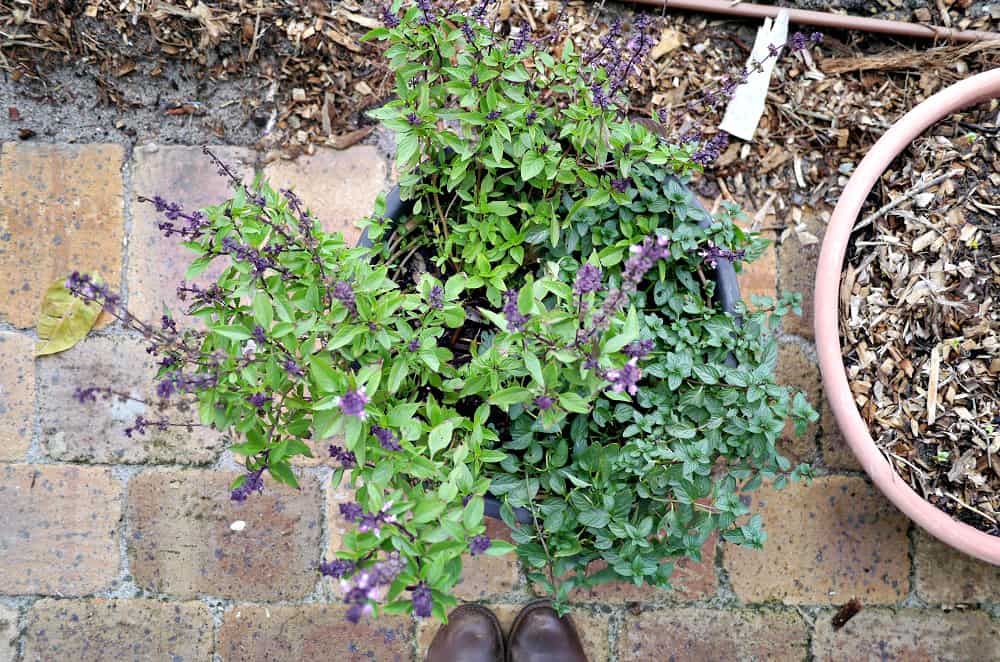


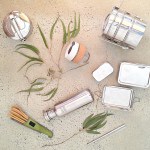

Enjoy your new garden! You have done well in the way of plastic! I did buy some seedlings in plastic pots this year but will either keep them to grow my own seedlings next year or pass them on to a farmer at the market. I put plastic over my tomato plants when they are wee to keep them warm but save and reuse each year. Not perfect and certainly room for improvement.
Also I am fascinated by your soil-less city.
Thank you! And thanks again! ; ) I expect we will get more plastic pots down the track – I’d like to get some fruit trees in the future, and they will definitely come in plastic! But plastic-free fruit is a delicious and worthwhile trade-off. We don’t have the problem with the cold really here, but we do have issues with slugs and slaters/woodlice and my neighbours make collars for their seddlings by cutting the base out of the plastic plant pot. Like you say, they can be reused many times!
It is strange to be soil-less! When I first moved here I put some seedlings straight in the ground – and yes, they died within days. Australian soils are very depleted because they are so old, and apparently Perth grey sand is officially the worst (or second worst) soil in the world! It is necessary to add clay and organic matter as it has neither. Not like gardening in the UK at all!
That is really fascinating about the soil. I can imagine that takes getting used to. I have almost the exact opposite problem of not being able to control the vegetation in the garden … Lots of invasive vines we are trying to fight off. We have slugs here too and I understand broken up egg shells can also be a deterrent. Enjoy your weekend!
Apologies for the delayed reply, I just dug this comment out of spam (no idea what it was doing there)! Yes it is really odd. We dug in some clay but I’m worrying it wasn’t enough as the beds already look like sand (and without the clay, all the organic matter will vanish). Still, it’s all learning…
Oh don’t worry, we still have plenty of weeds to worry about! Not invasive vines – invasive grasses! So far the slugs haven’t been an issue. Touch wood…
We know a place where you can pick up quite a bit of organic cow poo (needs to be composted) and then return the containers that were used in transport for re-use. (it’s Rusty Hollow Farm!) And there are a couple of bi-annual seed & cutting exchanges in the Perth & Freo area, plus the Transition Town Guildford crew have had several garden bits & pieces at their monthly public sharing session. Good luck with as your garden adventure continues to grow!
Haha, don’t share with the secret with everyone, there will be no cow poo left for me Debra! Or on second thoughts, there will still be plenty ; ) It’s great having friends like you and TTG who are two steps ahead of me, so that I can steal all your best ideas!
Thanks!
Wow, you really are doing well. I live in NZ and am able to go our local garden supplier armed with bags like the ones you have washed, where they are happy for me to fill them myself from the bulk heaps of potting mix, compost. This also works out a lot cheaper. Also, are you able to collect seaweed? I layer that on my garden and around fruit trees and make seaweed tea from it. Maybe you could get a local lawn contractor to deliver clippings to your place. I layer them straight on to my garden as mulch and they enrich the soil. I look forward to following your progress.
Thanks so much for all your great ideas Anne! I was planning on re-using the bags for soil, but our local bulk store has started giving me the big white plastic drums (I think they are 20 litres but I will have to check) so I thought I might use these instead – they have a handle and a lid!
Technically I don’t think I’m supposed to collect seaweed without a license? But I will investigate further. Do you know what type you collect – or do you just collect any old thing?!
The lawn clippings is a great idea – once we’ve got a composting system in place (with emphasis on the word “system”) I’ll have a look into this. I’ve heard of other people who do this so I am confident I can make it happen!
I look forward to my progress too! ; )
We just gather any seaweed, but the fleshier bull kelp and sea lettuce are best if they are there. We don’t have a law here (that I know of) prohibiting seaweed collection. I started laying grass clippings straight on the garden after seeing an article about a 90 year old who did that, and his garden was amazing. Apparently that was all he used.
Just looked up those two and maybe there isn’t a restriction after all. Will have to investigate further. Just read about a red seaweed called jelly weed that can be boiled to make jelly! I want to go seaweed hunting now!
Thanks for the tip!
We did a tour of a place that recycles mattresses, down Freo way, a year or so ago. They sold the coir reclaimed from the mattresses they stripped, just rolled up, no plastic package. I’m sorry I can’t remember the name of the place but am sure Peg Davies of MRC would know. We recently used some garden products purchased in plastic bags and repurposed them to line our raised garden bed (made from the wood from heat treated pallets) in an attempt to save our pallet garden from the termites and other beasties that like to decompose! I will admit to thinking about hand washing them too…until we reused them as they were for the lining!
I know the place Jac – I went there too! You mean Garbologie – and yes, it has closed down now. Such a shame. Another company purchased their equipment but I don’t know what they do with the coir. It would be too coarse for seedlings, though. I did buy some planters from them made of old mattress wood with a cot mattress and the climbing frame – they look great but they are not very practical. Plus there are so many rusty parts they are a tetanus infection waiting to happen! Still, we have them so we use them.
I’ve been thinking about making garden beds out of pallets – don’t tell me they get eaten! I did wonder about using the plastic as a liner but I think it’s too small for our needs.
I have a horrible feeling the place I mentioned has closed down.
Too much too soon for Perth… : /
I wouldn’t be recycling those bags, they are useful for so many gardening related things! Can be used to go and pick up soil or manure, pick up grass cuttings, dead leaves, garden waste and take them to the tip or compost heap. I personally also cut them up and use them to line my hanging baskets.
Oooh thanks for all the suggestions! Recycling does seem like a waste (and is definitely always my last resort). We want to go leaf collecting for our compost system and I hadn’t given much thought to what to use for the leaves – I think these would be great actually : )
Hi Lindsay. Good luck with your Perth garden! Not an easy place to grow veges! As a former West Australian (now Victorian) I have been fascinated to hear about wicking beds. I keep thinking that a wicking bed would make gardening in Perth a much more sustainable option. You may already know about them, if not, definitely worth a Google!
Thanks Rachelle! : ) Yes, Perth is nowhere near as easy as the UK. I didn’t know how lucky I was back then, with all that great soil! The main thing that puts me off wicking beds is the plastic liners! We thought about making our wine barrels into wicking beds, but opted for the conventional approach. Maybe if we get more trees in pots I will make wicking pots. I don’t think it will happen here with these beds any time soon, but you never know in the future… ; )
You are doing a fantastic job! I wish I could share some compost with you. We have so many leaves that I barely get them composted by the next fall, when of course there are more. I have to be selective where I use it though, as the weed seeds don’t all get cooked, and I can end up creating more work for myself. Your raised beds look wonderful.
Thanks Sandy! I wish you could too – you have no idea how much it pained me, going to the local hardware store and buying plastic bags of compost! But we’d bought some seedlings and kumquat trees and I needed it, and I couldn’t wait 12 weeks for ours to be ready!
The mulch we get delivered in the same… full of weed seeds! So much extra work! I’d like to get a hot compost bay going which would kill all the seeds, but we don’t really have the space. Something else to plan for in the future!
Great article. I have about 40-50 plant pots. Stopped buying soil years ago, just mixing in my compost and giving away plants to cycle thru soil. Most garden centers in Sydney have a pot reuse bin for people to drop off and / or pick up plastic or other pots. My compost in soil has created a seed bank of things that start growing when conditions are right and they are happy to grow. I don’t buy seeds but do give away seedling. There are also meetups and other groups for seed / seedling swapping. My 40-50 pots is still not a full yard, but it’s a fun experiment. Good luck!
Thanks Mel! 40-50 plant pots sounds awesome! I can’t wait to get our compost cranking – it will solve so many problems in terms of waste and plastic. I’ve discovered a few meetups for seed swapping etc here- I just need some things to swap ; ) I’ll have a look out for the container reuse collections – that’s a great idea : )
This is so encouraging! Been wondering about how to green a garden in more ways than one ;) thank you for inspiring!
Thanks Natalie! Good luck with greening your garden : )
If the verge pot supply dries up, Green Life Soil Co. on Farrall Rd in Swan View have a big bin where people put their used plastic pots – lots of different sizes and you can take whatever you like! :)
Thanks for the tip Amy : ) That is where I ordered my soil delivery from – I love those guys! The helpful chap I chatted to on the phone said I could get refills of soil amendments there too. Good to know about the pots. They’ve got it all!
I have a Soil Blocker that I bought from http://www.allsun.com.au/Blockers.html
It makes soil blocks that you can place your seed into without using plastic seedling punnets.
The soil block goes straight into the ground when the seedlings are old enough.
Toilet roll tubes are also good for growing seedlings and can go into the soil when the seedlings are old enough.
I’ve seen those on the interwebs… I think Milkwood use one. I didn’t realise they came in smaller sizes (I just looked at the link you shared). I only have a handful of plastic seedling punnets and I’m sure they will degrade in the sun within a year or too. I’ll have to replace them with one of these awesome devices. Thanks for the tip!
(I’ve also been saving up the toilet roll tubes – but we don’t go through enough toilet paper for the amount of seeds I want to plant!)
HI Lindsay,
You can actually make your own seed planting pots out of newspaper and they can be planted straight into the ground where they decompose. We have done this successfully!
Hi Emilie, I do this too! I made wicking beds earlier in the year and used a lot of the plastic pots to create the reservoirs underneath, so now I have far less. This is how I make mine: https://treadingmyownpath.com/2017/04/13/zero-waste-diy-newspaper-pots/ Do you use the same method?
Hi Lindsay. Can you give some more detail on how you made your wicking pots, please?
I tried saving bean seeds one year and planted them the following, however the beans came out totally different from the original green beans and were tough. Maybe they resorted to whatever combination they were bred from- I don’t know
That’s mysterious Victoria, I always thought bean seeds were good ones for saving. Maybe they were hybrid seeds and you didn’t realise? I have bought a book on seed-saving but am yet to devour much of it. But it is super interesting!
These are all great ideas. I take a lidded bucket to a local cafe to get coffee grounds which I then put into my compost bin to give more variety to the compost. I just keep using the same bucket. There are also some horse owners who sell bags of horse manure at the farm gate and they are happy to have the bags returned for them to use again.
That’s great Lorraine! There are so many solutions out there. And great to be using other people’s “waste”!
Why not collect nettle leaves and add them to a bucket of water. After a few weeks you will have a plant food but remember to dilute this before adding to your plants. Then add the old leaves to your compost bin.
Have you any suggestions for a non plastic alternative to netting to protect fruit and vegetables?
Thank you for all you are doing here. What are you using for your worm beds? Any commercially built ones seem to be made of plastic.
Hiya! What an interesting read. Thanks for sharing. I have been on my plastic free journey for probably 4 or 5 years now, but the garden is certainly difficult. I’m sure I misinterpreted what you said, but just checking you know that coffee grounds are a source of nitrogen, not carbon, right? Working as a barista I love to take what I can home, and we bag up the rest (in the used coffee bags) for gardeners to take home. I have mostly grown my plants from seedlings propagated from friends and family, however hope to grow from seed this year. How about searching for seed libraries in your area. Libraries often have a section dedicated to this where you can swap seeds or even take seeds and return some in the future. It’s a good way to steer clear of GMO seeds and keep heritage seeds continuing :)
Hi there! I’m just starting out in my gardening journey in perth and I was wondering which company you used to get the soil transported to you without plastic?
Thanks!
P.s (Loved your book!)
Best regards,
Joyce
Recommendations on fertilizer (no plastic containers)for succulents and cactus please?
I just found your posts. Thank you for sharing your journey. My hubby and I are also embarking on a plastics-free lifestyle, focusing on our veggie and fruit gardens this year. I’m wondering if you’ve found any providers of bulk soil or bagged soils that claim to be free of micro-plastics?